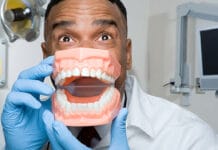Patients need to be treated as human beings with real concerns and valid questions and addressed with compassion, support, and empathy. Dental hygienists also need to share the same thought process with co-workers and leaders so that the whole team feels cared for, understood, and genuinely wants to be part of the dental practice.
This human trait can be learned, and the education gained will cascade into future conversations, exchanges, and meetings of the mind.
Though not a new concept in itself, emotional intelligence (EQ) is a newer concept in the workplace that addresses how we manage, empathize, and understand why someone feels the way they do, as well as how to respond accordingly.
Below are three scenarios that could happen in a dental workplace whereby EQ gained would prove to be valuable.
Scenarios Where EQ Can Bring Understanding
Scenario 1
“Read the room, will ya?” Mindi thought silently to herself as she listened in horror to the building tension during the monthly staff meeting. Shelley, the lead hygienist, was getting heated as she explained how she was annoyed with how the practice was running, or not running, for that matter.
Right or wrong, she wasn’t being her usual happy self these days, which was taking a toll on the rest of the staff. Mindi wondered what could be done but wasn’t sure how to approach the situation or if she even should.
Mindi wondered if this would have been a good time to practice something she had heard about called EQ. She knew this was an emerging thought process where anyone could learn to listen to others, be heard, and intervene effectively, so all parties feel understood. She had read that sometimes people act out of character when they are going through stressful life situations.
She considered that Shelley was masking something significant in her life that had changed, which was why she was getting aggressive with her words. It just wasn’t like her to be this way and make everyone feel so uncomfortable.
Mindi didn’t know how to respond, however. Should she consider learning more about EQ and how to develop the skill for future interactions with others?
Scenario 2
Dr. Casselman was very impressed during her interview with a new graduate hygienist. With such a shortage of hygienists in the industry, she was desperate to find the perfect match.
However, she didn’t want to just “settle” for whoever decided they would accept the position with the highest bid. She sought someone eager to learn the value system she exemplified in her practice and was waiting for the perfect person to join her team. So far, she had had both new graduates and seasoned ones alike hand over their resumes, smile, and give their usual speeches, but it did not really impress her according to what she was truly looking for. That is until Erik came in with a completely different approach and won her over.
You see, Erik is the type of person who believes that while his functional and technical skills will improve over time and experience, the movement of learning emotional intelligence is gaining ground quickly in the workforce. By understanding the needs of others and applying himself to learning how to develop himself in those areas, he brings more to the table. He was right, and he directly asked Dr. Casselman what her practice philosophy was and how he could develop himself to meet her needs. His devotion would be directed to patient care, and he would be open to all new modalities and learning experiences.
He won her over. By studying how to improve his EQ ahead of time, he could tune himself into reading Dr. Casselman’s body language, facial expressions, and responses to his questions and answers, thereby addressing her needs before they were even verbalized. This got him the job offer of a lifetime because he quickly learned that Dr. Casselman is very loved by her patients and staff alike and is a very generous employer.
Scenario 3
Danielle passed her patient, Molly, a clean tissue from her box on the counter. She could sense this would be an important time to listen to Molly and not push her to go too fast to “just get her cleaning done.”
While updating her medical history, Danielle asked if Molly had recently encountered any health changes. That’s when Molly burst into tears, apologizing and placing her hands over her face. Molly was about to reveal to Danielle that her husband was recently diagnosed with aggressive cancer and that she was sad, exhausted from caretaking, and barely made it to her appointment today.
What was the most crucial thing Molly needed, and how should Danielle approach this today?
Danielle was well-versed in EQ and took it upon herself to compassionately tell Molly to take her time, breathe, and cry if she wanted to. As a matter of fact, they didn’t even have to complete treatment today if she wasn’t up to it. If they didn’t complete the exam, that’s ok too. This took a lot of pressure off Molly, and she felt understood, cared for, and heard.
It turned out that all Molly needed was a listening ear and empathy from someone not directly involved with her home situation. She was able to dry her eyes, smile, and continue with treatment that day and even sent Danielle a thank-you card with flowers to the office the following week.
Self-reflection
The above three examples are but a few of the possible scenarios we approach in our dental workplaces. How often have we found ourselves looking like a deer in the dental headlights when these situations arise, and we don’t know how or if to respond? May I suggest we learn how to profoundly build on our EQ skills to aid our patients, contribute to effective communication with team members, and become an overall asset to the dental workforce?
In order to build on our present EQ, however, we must first know where we presently stand. We may wish to ask ourselves a few questions and do some self-reflection. If we are brave enough, we may spring to get some truths from a trusted friend or co-worker about how we might improve our emotional intelligence. Be open because you may not always hear what you want or even think about yourself. This is a growing experience that will pay off in spades down the road.
Below are just a few of the many examples of questions we may ask ourselves.
- Am I a generally positive person?
- Do I try to see things from another’s perspective?
- Do I recognize how my behavior affects others?
- Do I air grievances skillfully?
- Can I listen without being quick to judge?
- Am I able to admit my mistakes freely?
- Do I become easily defensive when criticized?
- Do I stay calm under pressure?
- Am I good at dealing with people?
- Am I good at influencing the way others feel?
Were you honest with yourself? Were you surprised at what you discovered about yourself, and now you’re wondering where to go from here?
In the next article of this series about EQ in the dental workplace, we will delve into EQ branch types and how to validate emotions in others using different techniques. We will learn how to develop and build on our EQ to be an asset to the dental practice as a whole.
Stay tuned, my friends and colleagues, and remember, as Theodore Roosevelt once said, “No one cares how much you know until they know how much your care.”
To read part two of the EQ series, click here. To read part three, click here.
Before you leave, check out the Today’s RDH self-study CE courses. All courses are peer-reviewed and non-sponsored to focus solely on pure education. Click here now.
















